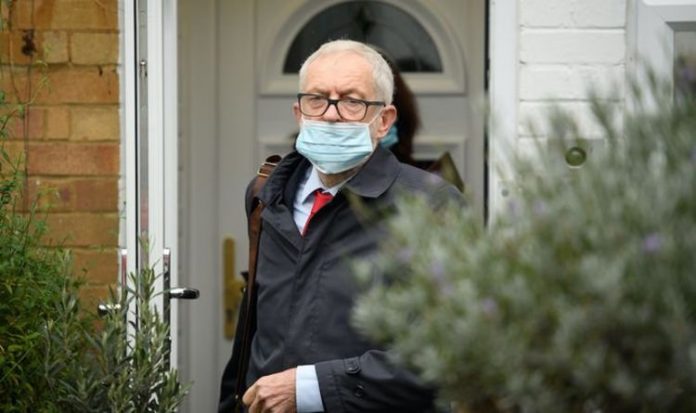Jeremy Corbyn says suspension is a ‘political issue’
The Labour Party voted overwhelmingly to remain a part of the EU in the 2016 referendum. Its current leader, Sir Keir Starmer, is strongly associated with the Remain cause but has recently tried to shed his pro-EU image. He has promised to uphold the referendum result, and whipped his MPs to vote for Prime Minister Boris Johnson’s UK-EU deal.
He faced opposition as 37 MPs abstained or voted against the deal – those MPs who refused to accept the details of the agreement, or indeed any withdrawal from the EU at all.
These ideologically inclined Labour members are what Paul Embery, a leading trade unionist and party member describes as “fanatically pro-EU”.
It is these sorts of people who arguably forced former leader Jeremy Corbyn’s hand in supporting the Remain camp, as the firm socialist had been a eurosceptic for the most part of his political career.
In 1993, he described the “great danger to the cause of socialism in this country or any other country of the imposition of a bankers’ Europe on the people of this country”.

Jerermy Corbyn: The former Labour leader was forced into backing Remain, it has been claimed (Image: GETTY)

Keir Starmer: The People’s Vote architect has accepted the referendum result (Image: GETTY)
It was his fear that a centralised EU power would dilute any chances of a socialist government implementing sprawling state aide and economic subsidy programmes.
In 2015, he told Reuters he voted against Britain’s membership of the trade bloc’s forerunner, the European Economic Community (EEC), when Labour Prime Minister Harold Wilson put the question to a public ballot in 1975.
Yet, fast forward four decades, and Mr Corbyn had himself adopted the European cause.
A move that confused many, Mr Embery said the former leader had been forced into a corner and lapsed on his principles.
JUST IN: Labour branch passes no-confidence vote in leader Keir Starmer

Eurosceptic: Corbyn, pictured in 1975, was a staunch eurosceptic opposed to EU centralised power (Image: GETTY)
He said: “Someone once put it that Corbyn was placed under ideological house arrest by the Parliamentary Labour Party (PLP).
“And because the PLP, in some cases, were so fanatically pro-EU, Corbyn – who of course, was a lifelong Brexiteer, and privately still is – was forced to back Remain.
“Others like John McDonnell, his right-hand man, were also Brexiteers.
“I think they calculated that if they came out for Leave, they’d get crucified by their MPs.
“So I would say they made a tactical decision, bearing in mind he was coming under a lot of pressure from the PLP anyway, because frankly, they hated him.
DON’T MISS
Keir Starmer’s heartbreak at Theresa May’s resignation unveiled [REPORT]
McCluskey humiliation as union boss ‘poised to back’ despite fallout [INSIGHT]
Jeremy Corbyn’s devastating legacy ‘still felt’ in Scotland [ANALYSIS]

Brexit: Corbyn bowed down to the party’s official Remain line, it has been suggested (Image: GETTY)

Labour Party: Corbyn travelled around the country urging voters to choose Remain (Image: GETTY)
“He made a decision that went, ‘This is just not worth the battle, we’re going to have to go along with what they want.’
“He conditionally stood in that tradition of the likes of Tony Benn, Peter Shore, Michael Foot: people who were heavyweights in the Labour Party but part of that very rich eurosceptic tradition that was once so strong in the party.
“I suspect Corbyn feels and thinks all of those things still – but he was a victim of circumstance in some respects.”
Mr Corbyn’s rhetoric surrounding the EU mirrored that of some of the Leave campaign’s most notable figures.
In 1996, he railed against “a European bureaucracy totally unaccountable to anybody,” lamenting that “powers have gone from national parliaments”.

Starmer’s Brexit: The new Labour leader has flip-flopped his way through Brexit (Image: Express Newspapers)
And ahead of Ireland’s 2009 referendum on the Lisbon Treaty, Mr Corbyn said of the EU’s ties with NATO: “We are creating for ourselves here one massive great Frankenstein that will damage all of us in the long run.”
On the campaign trail leading up to the 2016 referendum, the then Labour leader was criticised for his “lukewarm” promotion of Labour’s official line – Remain.
Just weeks before the vote, he famously told Channel 4’s ‘The Last Leg’ that his enthusiasm for EU membership was about “seven, or seven and a half out of 10”.
He eventually made clear that he believed there was an “overwhelming case” for remaining in the bloc.
Yet, his flip-flop act had already sown much damage.

Corbyn out: In the end many voters and Labour members wanted to see the back end of Corbyn (Image: GETTY)
The electorate became disaffected with him and Labour.
This was only furthered after the Brexit result and chaos that ensued.
When the potential for a future Brexit referendum was a real possibility, Mr Corbyn said he would adopt a “neutral” stance on such an event.
Prime Minister Johnson harnessed the response and questioned how Mr Corbyn – a man hoping to become Prime Minister – could be so “indifferent” on such a big issue.
Mr Corbyn has since attempted to block the Government’s efforts to get a deal, having abstained from voting on Mr Johnson’s agreement with the EU late last year.
In a tweet in December, he wrote: “I cannot vote for this deal, which this Government will use to drive down rights and protections, and step up the sell-off of our vital public services.
“We need instead to break with failed race-to-the-bottom policies and build a Britain that puts people before private profit.”







